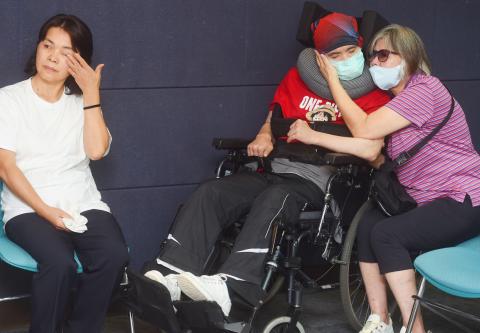The Presidential Office yesterday said it respects Representative to Singapore Antonio Chiang’s (江春男) decision to step down from his post over a drunk-driving case.
“President Tsai Ing-wen (蔡英文) respects Chiang’s decision to resign from his post. Arrangements will be made for the designation of a new representative to Singapore,” Presidential Office spokesman Alex Huang (黃重諺) said.
Huang made the remarks shortly after Chiang issued a statement through the state-owned Central News Agency yesterday morning announcing his resignation, amid calls from advocates against drunk driving that Chiang be removed from his post.

Photo: Chien Jung-fong, Taipei Times
“I do not seek fame and social status. All I have ever wanted was to dedicate myself to this island, but I have been torn by guilt for causing problems for the government before assuming the post,” Chiang wrote, adding that he had tendered his resignation to Tsai and Minister of Foreign Affairs David Lee (李大維) earlier in the day.
Chiang was caught driving with a blood alcohol content of 0.27 milligrams per liter (mg/L) in Taipei late on Tuesday last week, hours after he was sworn in to the diplomatic post.
Citing Chiang’s demonstration of remorse and that his drunk-driving violation did not cause any injuries, the Taipei District Prosecutors’ Office on Monday provisionally suspended his case and fined him NT$60,000.
According to Article 185-3 of the Criminal Code, a person who drives with a breath alcohol content of 0.25mg/L, or blood alcohol concentration of 0.05 percent, or more faces a prison term of up to two years and a fine of up to NT$200,000.
Since news of Chiang’s drunk driving case broke, members of the group Taiwan Against Drunk Driving had been staging protests urging him to resign and called on the government to replace him.
Ministry of Foreign Affairs spokeswoman Eleanor Wang (王珮玲) said that the ministry has conveyed the office’s statement to the Singaporean government.
Chiang, a veteran journalist and first editor-in-chief of the Taipei Times, served as deputy secretary-general of the National Security Council from 2000 to 2004 under the previous Democratic Progressive Party government.
Until recently, he was a columnist who wrote frequently for the Chinese-language Apple Daily on political affairs.
Additional reporting by CNA

The US government has signed defense cooperation agreements with Japan and the Philippines to boost the deterrence capabilities of countries in the first island chain, a report by the National Security Bureau (NSB) showed. The main countries on the first island chain include the two nations and Taiwan. The bureau is to present the report at a meeting of the legislature’s Foreign Affairs and National Defense Committee tomorrow. The US military has deployed Typhon missile systems to Japan’s Yamaguchi Prefecture and Zambales province in the Philippines during their joint military exercises. It has also installed NMESIS anti-ship systems in Japan’s Okinawa

TRAGEDY STRIKES TAIPEI: The suspect died after falling off a building after he threw smoke grenades into Taipei Main Station and went on a killing spree in Zhongshan A 27-year-old suspect allegedly threw smoke grenades in Taipei Main Station and then proceeded to Zhongshan MRT Station in a random killing spree that resulted in the death of the suspect and two other civilians, and seven injured, including one in critical condition, as of press time last night. The suspect, identified as a man surnamed Chang Wen (張文), allegedly began the attack at Taipei Main Station, the Taipei Fire Department said, adding that it received a report at 5:24pm that smoke grenades had been thrown in the station. One man in his 50s was rushed to hospital after a cardiac arrest

‘WIN-WIN’: The Philippines, and central and eastern European countries are important potential drone cooperation partners, Minister of Foreign Affairs Lin Chia-lung said Minister of Foreign Affairs Lin Chia-lung (林佳龍) in an interview published yesterday confirmed that there are joint ventures between Taiwan and Poland in the drone industry. Lin made the remark in an exclusive interview with the Chinese-language Liberty Times (the Taipei Times’ sister paper). The government-backed Taiwan Excellence Drone International Business Opportunities Alliance and the Polish Chamber of Unmanned Systems on Wednesday last week signed a memorandum of understanding in Poland to develop a “non-China” supply chain for drones and work together on key technologies. Asked if Taiwan prioritized Poland among central and eastern European countries in drone collaboration, Lin

ON ALERT: Taiwan’s partners would issue warnings if China attempted to use Interpol to target Taiwanese, and the global body has mechanisms to prevent it, an official said China has stationed two to four people specializing in Taiwan affairs at its embassies in several democratic countries to monitor and harass Taiwanese, actions that the host nations would not tolerate, National Security Bureau (NSB) Director-General Tsai Ming-yen (蔡明彥) said yesterday. Tsai made the comments at a meeting of the legislature’s Foreign Affairs and National Defense Committee, which asked him and Minister of National Defense Wellington Koo (顧立雄) to report on potential conflicts in the Taiwan Strait and military preparedness. Democratic Progressive Party (DPP) Legislator Michelle Lin (林楚茵) expressed concern that Beijing has posted personnel from China’s Taiwan Affairs Office to its